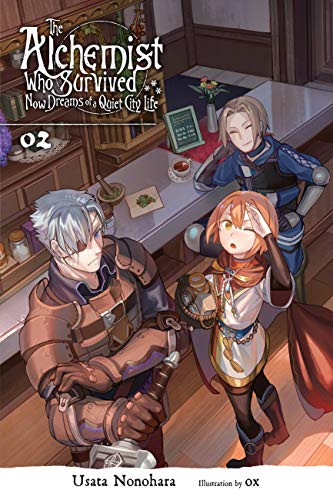By Usata Nonohara and ox. Released in Japan as “Ikinokori Renkinjutsushi wa Machi de Shizuka ni Kurashitai” by Kadokawa Shoten. Released in North America by Yen On. Translated by Erin Husson.
The second volume of this series has many of the same strengths and weaknesses that the first has. The writing is good and makes you want to see what’s coming next. There is slightly less detail about the creation of potions, which pleased me. Those who are into deep worldbuilding will love it. But it seems tonally off in a way that means I can never quite love it. The author still wants to use slavery and critique it, but also shows us that all the slaves we meet are “bad guys being punished for robbery and murder” so that we’re still OK with it in this series. More to the point, there’s a disconnect between the world this book exists in and Mariela herself, and I don’t just mean that she’s displaced by 200 years from her old world, though that might explain it. It’s a slice of grim-n-gritty life, with Mariela being a bright ball of sunshine bringing joy into everyone’s life. The two don’t always mesh.
There’s a lot going on in this 2nd volume, even longer than the first – and the first was quite long. Mariela and Sieg are trying to run her shop, meet new people, and avoid having her outed as an alchemist, as she’d rather not be shut up in a building and worked to death. We see as the book moves along that her fears are not entirely unfounded. The Kingdom is still trying to beat the Labyrinth once and for all, helped out by Mariela’s Holy Water. And a noble family has a dark secret, one not entirely known to the nice girl who befriends Mariela and shows her the wonders of modern appliances, but her older brother certainly knows and is obsessed with it. What is concealed in a secret passageway in their mansion? And what kinds of things are being done to slaves to ensure the safety of the royal family?
If it sounds like this turned into a different story, you’re thinking along the lines I was. The last part of the book is quite dark and disturbing, with sacrifices, blood magic, and graphic descriptions of people’s heads cut open and brains showing. It contrasts with the childlike Mariela, who is shown to be even more childlike than she had been before in these scenes, as if the author wanted to emphasize the contrast but took it too far. Indeed, for most of the book the author can’t quite decide whether Mariela is meant to act like a 16-year-old or a 6-year-old, and it pinwheels between the two. This is especially discomfiting given that both Sieg and Lynx are shown to be falling for her. Innocent is fine, immature is less so.
Despite this, the book overall is very readable, and while it has many parts that annoy me I don’t actually feel the need to drop it yet. The flashback scenes showing Mariela’s first learning of alchemy and the relationship with her master are excellent. I just wish the author would stay in the fantasy-slice-of-life lane and stop making detours to the wrong side of the tracks.


Speak Your Mind